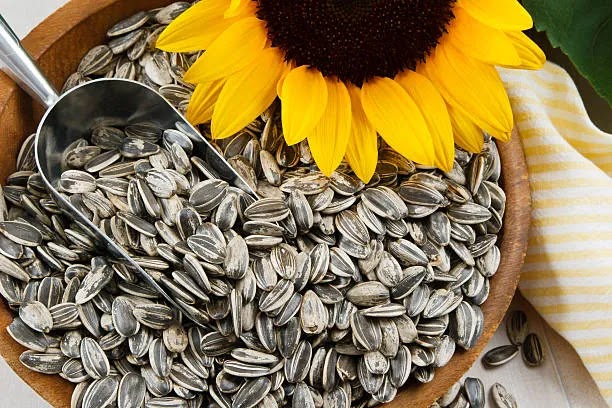Sunflower seeds are collected
from the sunflower plant's flower head. Sunflower seeds are white and have a
tender texture while having encased in a black and white striped shell. The
seeds can be eaten raw, roasted, or incorporated into other dishes and are
known for their distinct nutty flavor and excellent nutritional value.
Health Benefits
Sunflower seed eating has been linked to several health benefits,
including a reduced risk of high blood pressure and heart disease. They also
provide nutrients to help your immune system and give you more energy.
Here are some of the health benefits of sunflower seeds:
Reducing Inflammation
Sunflower seeds can offer anti-inflammatory benefits for those
with short-term or chronic inflammation. Vitamin E, flavonoids, and other plant
compounds found in sunflower seeds can help to reduce inflammation. According
to a study, eating sunflower seeds and other seeds five times or more per week
reduced inflammation, lowering risk factors for various chronic diseases.
Improving Heart Health
Sunflower seeds are high in polyunsaturated and monounsaturated
fats, suitable for you. A three-fourths cup serving of sunflower seeds contains
14 grams of fat. According to research, consumption of seeds, including
sunflower seeds, has been related to lower rates of cardiovascular disease,
high cholesterol, and high blood pressure.
Supporting the Immune System
Sunflower seeds contain a variety of vitamins and minerals that
can help to boost your immune system and boost your ability to fight viruses.
These include both zinc and selenium. Zinc is essential for the immune system
as it aids in the maintenance and development of immune cells. Selenium also
plays a role in reducing inflammation, fighting infection, and boosting
immunity.
Boosting Energy Levels
While the high protein levels in sunflower seeds already help
boost your energy levels, other nutrients like vitamin B and selenium can help
keep you energized. The vitamin B1 (also known as thiamin) present in sunflower
seeds can help you convert food to energy, keeping you active throughout the
day. Selenium can help your body get more oxygen by increasing the blood flow.
Nutrition
Sunflower seeds are high in protein and rich in healthy fats and
antioxidants that can lower your risk of developing severe conditions.
It's also an excellent source of:
- Vitamin E
- Vitamin B1
- Vitamin B6
- Iron
- Copper
- Selenium
- Manganese
- Zinc
- Potassium
Nutrients per Serving
According to the USDA, ¼ cup of dry roasted sunflower seeds
without salt contains:
Calories: 207
Protein: 5.8 grams
Fat: 19 grams
Carbohydrates: 7 grams
Fiber: 3.9 grams
Portion Sizes
Portion Sizes
Sunflower seeds are high in nutrients, but they also have many
calories. It's essential to keep servings to a quarter cup at a time. Many eat
the seeds in the shell to slow the caloric intake while snacking, as it takes
time to crack open and spit out each shell.
However, keep in mind that the shells are often coated in salt —
about 70 mg per 1 oz of sunflower seeds. If you're watching your salt intake,
look for unsalted sunflower seeds and moderate your portions.
How to Eat Sunflower Seeds
Sunflower seeds are typically sold inside the shell and are eaten
roasted or raw. Eating shelled sunflower seeds requires you to crack them open
with your teeth and spit out the shell — which shouldn't be eaten.
Using your tongue, position the shell vertically or horizontally
between your molars. Crack the shell with your teeth and separate the seed from
the shell. After that, spit out the shell and eat the seed.
You can also eat sunflower seeds in a variety of dishes. Here are
a few ways you can incorporate them into meals:
- Sprinkle on top of a salad
- Add to trail mix
- Stir into the oatmeal
- Sprinkle over stir fry or mixed vegetables
- Add to veggie burgers.
- Mix into baked goods
- Use sunflower butter in place of peanut butter.
- Cook with sunflower oil instead of other oils






